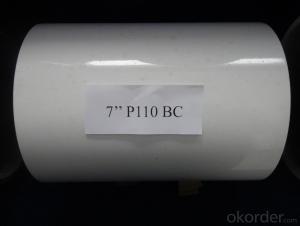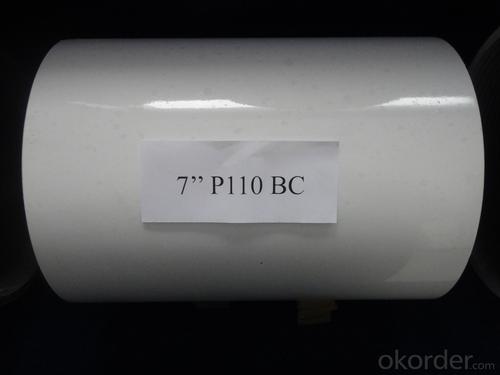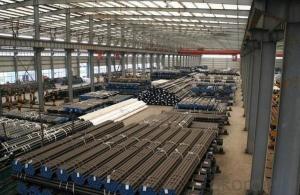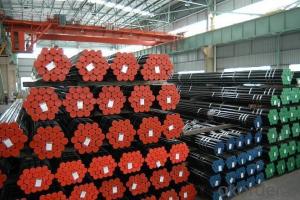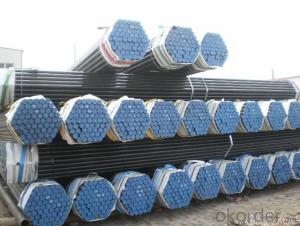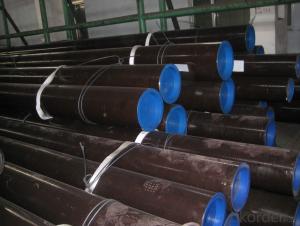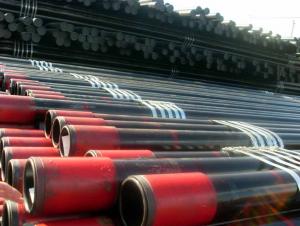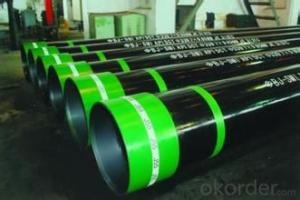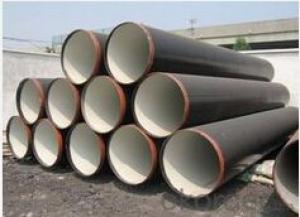API 5CT Casing Pipe for conveyance of gas, petroleum, liquid and electricity
- Loading Port:
- Shanghai
- Payment Terms:
- TT OR LC
- Min Order Qty:
- 10 m.t.
- Supply Capability:
- 100000 m.t./month
OKorder Service Pledge
OKorder Financial Service
You Might Also Like
Technique Parameters
Casing Technical Specification (Standard API Spec 5 CT) | |||||||
Size | Outside Diameter | Inside Diameter | Grade | Wall Thickness | |||
in | mm | in | mm | in | mm | ||
4-1/2 | 4.500 | 114.30 | 4.000 | 101.60 | J55K55N80 | 0.250 | 6.35 |
3.920 | 99.57 | J55K55N80 | 0.290 | 7.37 | |||
5 | 5.000 | 127.00 | 4.408 | 111.96 | J55K55N80 | 0.296 | 7.52 |
4.276 | 108.61 | N80P110 | 0.362 | 9.29 | |||
4.126 | 104.80 | N80P110 | 0.437 | 11.10 | |||
5-1/2 | 5.500 | 139.70 | 4.892 | 124.26 | J55K55N80 | 0.304 | 7.72 |
4.778 | 121.36 | N80 | 0.361 | 9.17 | |||
4.670 | 118.62 | N80 | 0.415 | 10.54 | |||
7 | 7.000 | 177.80 | 6.366 | 161.70 | J55K55N80 | 0.317 | 8.05 |
6.276 | 159.41 | J55K55N80 | 0.362 | 9.19 | |||
6.184 | 157.07 | N80 | 0.408 | 10.36 | |||
9-5/8 | 9.625 | 244.48 | 8.755 | 222.38 | N80 | 0.435 | 11.05 |
8.681 | 222.50 | N80 | 0.472 | 11.99 | |||
10-3/4 | 10.750 | 273.05 | 10.050 | 255.27 | H40J55K55N80 | 0.350 | 8.89 |
9.850 | 250.19 | J55K55N80 | 0.450 | 11.43 | |||
13-3/8 | 13.375 | 339.72 | 12.615 | 320.42 | J55K55 | 0.380 | 9.65 |
12.415 | 315.34 | J55K55N80 | 0.480 | 12.19 | |||
- Q: What are the common sizes of steel pipes available?
- The common sizes of steel pipes available vary widely depending on the application, but some standard sizes include 1/8 inch, 1/4 inch, 1/2 inch, 3/4 inch, 1 inch, 2 inch, 3 inch, 4 inch, 6 inch, 8 inch, 10 inch, 12 inch, 14 inch, 16 inch, 18 inch, 20 inch, 24 inch, 30 inch, 36 inch, 42 inch, 48 inch, 60 inch, and 72 inch.
- Q: What is the standard length of steel pipes?
- The standard length of steel pipes can vary depending on the application and industry, but commonly they are available in lengths of 20 feet or 6 meters.
- Q: How are steel pipes protected against lightning strikes?
- Steel pipes are protected against lightning strikes by installing lightning rods or grounding systems near the pipes. These systems provide a path of least resistance for lightning to follow, diverting the electrical current away from the pipes and minimizing the risk of damage or explosions.
- Q: Can steel pipes be used for pharmaceutical manufacturing?
- No, steel pipes are not typically used for pharmaceutical manufacturing as they can pose a risk of contamination and corrosion. Instead, pharmaceutical manufacturing typically relies on materials such as stainless steel or specialized polymers that are more suitable for maintaining sterile conditions and ensuring product purity.
- Q: How are steel pipes used in the electronics industry?
- Steel pipes are commonly used in the electronics industry for the transportation of various gases and liquids, such as coolant and process fluids, within electronic systems. They are also utilized for the construction of supporting structures and frameworks in electronic equipment and facilities.
- Q: What are the disadvantages of using steel pipes?
- One major disadvantage of using steel pipes is their susceptibility to corrosion. Over time, exposure to moisture and certain chemicals can cause the pipes to rust and weaken, leading to leaks or structural damage. Additionally, steel pipes are generally heavier and more expensive than alternative materials, making them less suitable for certain applications where weight and cost are crucial factors.
- Q: How are steel pipes joined together?
- Steel pipes are commonly joined together using various welding techniques, such as arc welding, butt welding, or socket welding. Additionally, other methods like threaded connections, flanges, or mechanical couplings can be used for joining steel pipes.
- Q: How are steel pipes used in transportation?
- Steel pipes are commonly used in transportation for various purposes, such as in the construction of pipelines for transporting oil, gas, and water. They are also utilized in manufacturing vehicles, ships, and airplanes, where they serve as structural components or exhaust systems. Additionally, steel pipes are employed in the transportation of goods through conveyor systems and in the construction of railings and barriers for safety on roads and bridges.
- Q: Can steel pipes be used for underground utility lines?
- Yes, steel pipes can be used for underground utility lines. Steel pipes are known for their durability and strength, making them suitable for underground applications. They can withstand heavy loads, pressure, and corrosion, which are essential factors for utility lines that are buried underground. Additionally, steel pipes can be welded or threaded together, allowing for easy installation and maintenance.
- Q: Can stainless steel pipes spray black paint?
- Yes, after painting, I usually touch hands and paint off in 2 years or so
Send your message to us
API 5CT Casing Pipe for conveyance of gas, petroleum, liquid and electricity
- Loading Port:
- Shanghai
- Payment Terms:
- TT OR LC
- Min Order Qty:
- 10 m.t.
- Supply Capability:
- 100000 m.t./month
OKorder Service Pledge
OKorder Financial Service
Similar products
Hot products
Hot Searches
Related keywords
